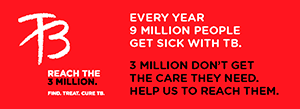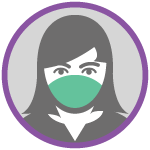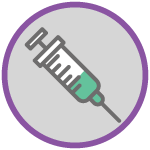About TB and HIV
Tuberculosis has a disproportionate impact on women and girls living with HIV.
What can we do?
TAKE STEPS TO PROTECT YOURSELF FROM TB!
Here are a few tips to help protect yourself and here are some links for more detailed advice:
- Avoid spending long periods of time in spaces that are not well ventilated with anyone who has active TB;
- If you live with someone who has active TB, encourage the person to cover their mouth when coughing and to adhere to their treatment regime;
- If you are living with HIV you should discuss with your health worker whether you are eligible for TB preventive therapy, such as isoniazid;
- Open windows and curtains at home and in public places such as health care clinics, and encourage others to do the same.
SEEK EARLY DIAGNOSIS!
Early diagnosis means early treatment and better outcomes. It also means that you should take ART as soon as possible if you are living with HIV. Common symptoms of TB are a cough for more than two weeks (sometimes with blood), weight loss, night sweats and fever. If you have signs and symptoms of TB or have been exposed to someone who is sick with TB, seek information and support from health care workers about treatment and prevention.
TALK TO YOUR SISTERS LIVING WITH HIV ABOUT TB
As women living with HIV, we can make a point today to talk to our sisters and family members about TB and teach our family members about the signs and symptoms of TB.
TAKE ACTION!
Reach out to your local leadership and ministries of health and advocate! Ask them to:
- Promote gender-equitable access to TB prevention, diagnosis, treatment, care and support.
- Ensure women living with HIV have a voice in interventions to integrate TB screening and treatment within a variety of care settings including mother and child health care services.
- Ensure that Women living with HIV are able to make informed decisions about their own treatment and care.
- Eliminate stigma, discrimination, and other barriers to ensure that women living with HIV & other marginalized populations can receive the care they need and are entitled to.

More Resources
Head to our Library page for more papers and other documents.
Newsletter Sign Up
Get the latest news in your inbox!
Author
Table of Contents
Toggle


